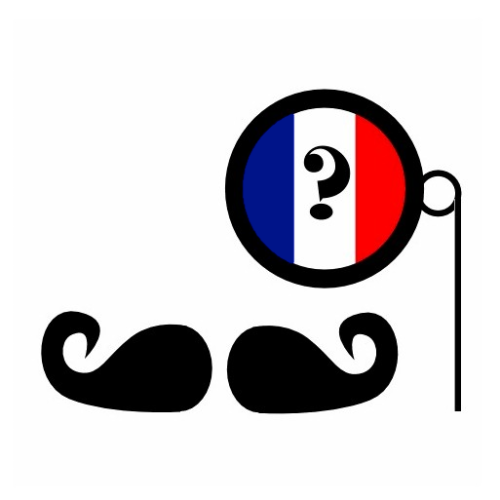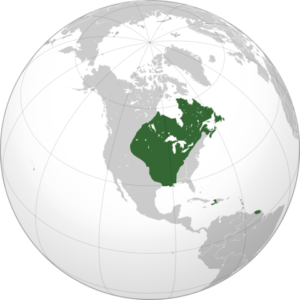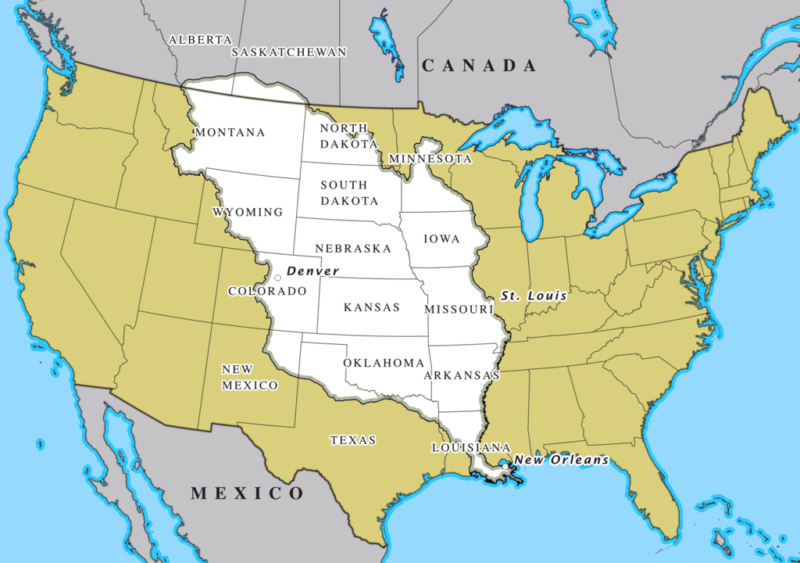
A while ago, in 2001 to be precise, when I lived in Florida, I met a woman who became a good friend and who was a Francophile (one of the few Francophiles I met in the US who tried to befriend me and succeeded, sadly we lost touch). One day she told me that she could claim French citizenship if she ever were to move to France because she was born in Oklahoma, which was formerly part of French Louisiana.
My first reaction was “What the?”
She explained. Apparently, there was a law in France that allowed people born in any former French territory to acquire French citizenship if they moved to France. That included territories that were former French Louisiana. I have to admit, I found the thing a little ludicrous. She was a woman of many quirks and peculiarities – some endearing, some annoying – and I kinda filed what she said under one of those. Yet, while her propensity to wishful thinking sometimes got in the way of her rational thinking, she also was a bright and educated woman. So her claim couldn’t just be hearsay, there must have been a valid basis for it somewhere.
I never bothered to find out the truthful details behind the story at the time – it’s not something we talked about every day – and eventually, I more or less forgot about it.
Then, over the years, I heard other Americans mention that law. However, I’ve never heard of any American acquiring French citizenship that way. So, I ended up dismissing the whole thing as an unfounded rumor that at some point spread among American Francophile circles for obvious reasons.
A few days ago, in a discussion about different ways to acquire citizenship in various countries, especially the whole Jus Solis vs Jus Sanginis thing, the Louisiana Purchase story came up again.
I couldn’t believe that this rumor was still making the rounds two decades later, and doubt started creeping up. What if there was some truth to it, as outlandish as it seemed? So, I decided to investigate and find out the whole truth. Nowadays, thanks to the web, it’s much easier than 20 years ago.
Here is what I found…
But wait!
Some of you may not be well versed in Franco-American history, so maybe I should start with a short history lesson for the non-French, non-American among you. As well as the French and the Americans who need to brush up their knowledge of history a little.
New France: a very brief history
The year is 1492. Christopher Columbus “discovered” a new land that had been previously discovered by countless other people (first and foremost the Native Americans’ ancestors, but also a bunch of Vikings, some Polynesians, not to mention unproven theories and stories about Basque fishermen and whalers, Japanese sailors, or even Western Africans or Ancient Romans, and more – some theories are more likely than others, but while fascinating, this is not our topic today).
Soon after, all of Europe (but mainly France, England, and Spain) colonized this new continent calling dibs on all the land they could find, taking advantage of the fact that the people living there were being genocided at the same time by all the germs the Europeans brought with them – unknowingly at first, and more than probably very knowingly a bit later.
Fast forward three centuries. Some of the British colonies of North America seceded from England to form a new country unoriginally called the United States of America. At the time (the end of the 18th Century) the country was just a fraction of the size of what it is now. It basically was the Atlantic Coast and not much more (and not even all of the coast).

Meanwhile, France had been busy too. It had colonized pretty much the whole Eastern half of Canada and the whole Mississippi/Missouri/Ohio basins (that is basically the whole MidWest and Great Lakes regions of the current US).
One important thing needs to be noted. The colonization of North America by France occurred in a very different manner from the one perpetrated by England. Whereas a lot of people emigrated from England to the Colonies (enough to be able to secede and form their own country when the time came), very few French people emigrated to North America. New France was mostly a place to do business (the fur trade was a big deal at the time, there even was a war about it). As a consequence, New France was very sparsely populated by French settlers. The only areas that were not almost empty of them were New Orleans and the St Lawrence’s estuary (nowadays Québec). To give you an idea, by the mid-1700s the French population of North America was estimated to be around 70,000 as opposed to 1.6 million people in the British colonies. For a territory that was much larger, as you can see on the map.
The fact that there was no significant French population in North America partly explains how France lost all of these territories so easily. Indeed, all of this land was lost in just one century (nowadays, the only French lands in North America are the tiny islands of St Pierre & Miquelon – if you’ve never heard of them, don’t feel too bad, most French people only have a vague idea of their existence). First, there was the Treaty of Utrecht in 1713 when France ceded Newfoundland and Hudson Bay to England after the Spanish war of succession (if you’re not familiar with it, don’t ask, it’s a mess). Then, at the end of the Seven Years’ War – that France badly lost – all of the northern and eastern parts of New France (today’s Canada, as well as the land east of the Mississippi) became English. All of the land on the western side of the Mississippi became Spanish (France and Spain were allies in that war, but… well, it’s complicated).
By 1763, New France had pretty much ceased to exist, only a few settlements remained here and there.
Oh, by the way, if you’re curious about why France also loses its wars, I have a post coming soon about that. Stay tuned (and subscribe to the blog and its social media to not miss it).
French Louisiana and its Purchase: the largest real estate transaction in history
The year is now 1803. And French Louisiana…
Wait… Didn’t I just say that New France didn’t exist anymore and that Louisiana was ceded to Spain in 1763?
Yes, I did… I also told you it was complicated. The thing is that Louisiana was retroceded to France in 1800, albeit only officially in 1803! How could it remain a secret for almost three years? I’d go with no internet and the very sparsely populated thing.
So, in 1803, French Louisiana was a thing again. Not that anyone really cared back in France. Especially because almost no French people lived there anymore (during the previous 40 years most of them returned to France, died, or were quite old at that point)
Also, and more importantly, France was right in the middle of what probably is the messiest period of its own history. Remember. 1789, French Revolution. 1792, France is at war with all of Europe for more than a decade, the continent’s other monarchs were not too fond of this Revolution thing. 1799, Napoleon and two of his friends take over France and rule it as “consuls.” 1800, Napoleon ditches the two friends and is the sole man in charge. He will proclaim himself Emperor in 1804. Details are for another day.
So what was the situation in 1803? Why did Napoleon sell a territory so big that could have brought so much to France? Well, woulda, coulda, shoulda. In 1803, French Louisiana is not of much use to Napoleon. What he needs is money. Lots of money. France has been at war for 11 years against almost all of Europe with no end in sight. War is not cheap, even less so when it lasts so long.
The US and France had a common enemy, Britain. The US was also one of the only countries that were friendly with France (despite all of the trash-talking between the two countries, they’re probably the only two Western powers that have never been at war with each other). The US wanted more land and free access to the Mississippi. They were also afraid that France had colonial aspirations in North America again (Napoleon had sent an army to protect New Orleans, and there was the whole Haitian Independence thing happening at the time too). The situation could lead to a war between France and the US. If that were to happen, the US would have no choice but to beg for an alliance with the UK, and you can imagine how that would have gone. Spain was also acting sketchy with Florida (it had recently regained the territory from England and was supposed to hand it over to France along with Louisiana, but it didn’t do it when the time came).
In other words, the situation looked more and more explosive. Napoleon couldn’t risk war in North America, not just when he was starting to invade and take control of most of Europe. He had a choice to make: abandoning North America to be able to take over Europe, or starting pretty much from scratch in North America, risking war while doing it, and also risking losing badly in Europe in the process. The more he looked at it, the more obvious the decision became.
So… Farewell Louisiana! Hello, all of these big bucks that allowed him to conquer Europe and to make a long-term friend in North America.
The consequences were numerous. The US doubled its size overnight, which eventually allowed it to become a country that mattered on the international scene. France and the US let Haiti become independent, but they would make it pay for it for decades to come. Of course, no one consulted the native population and it eventually led to the Trail of Tears. And in the early 21st Century a bunch of Americans asserted that they could become French because there were born on land that was French for a few months during the First French Republic, 200 years prior.
And by the way, why is it only about the land included by the Louisiana Purchase that is always mentioned? Why not the other lands on the first map (east of the Mississippi, the Great Lakes region, and such)? Because they belonged to the Kingdom of France and not the French Republic? Because people don’t know their history? No idea.
After this long history lesson (and believe me, I made it as short as possible), I guess it’s time to see…
What the French law says
The law we’re talking about here is in the Civil Code set of laws. More precisely, articles 21-14-1 to 21-25-1 pertaining to acquiring French citizenship by decision of the public authority.
Ok, the website is pretty hard to navigate if you’re trying to read all of it (it’s an official website from the French administration, after all, you didn’t expect user-friendliness, did you?). You also need to have a very good level of legalese French. (and as my legalese English is not so great, I won’t risk mistranslating it)
So I’ll save you the suspense.
You can’t!
You can’t become a French citizen because you were born on land that was part of French Louisiana once!
However, it turns out that contrary to what I assumed, we’re not in an “unfounded rumor” situation here. It’s a bit more complex than that.
The French laws regarding nationality and naturalization have changed quite a bit in recent decades (spoiler alert: they’ve become less and less immigration-friendly over the years). And at some point, it’s true that if you were born on a former French territory you could… apply for naturalization without having five years of residency. But that’s pretty much it. You still had to go through the regular naturalization process. You still had to meet all the other criteria. You didn’t need to have been a resident for five years before applying. And that is all.
It was in article 21-19: (formerly article 64 of the “French Nationality Code”)
5° Le ressortissant ou ancien ressortissant des territoires et des Etats sur lesquels la France a exercé soit la souveraineté, soit un protectorat, un mandat ou une tutelle ;
“Nationals or former nationals of territories and states over which France has exerted sovereignty, a protectorate, a mandate or a tutelage.”
However, this part of the law was repealed in 2006!
So, now, people born in former French Louisiana need to have these five years of residency in France, just like almost everyone else.
The reason why the law was repealed is pretty interesting, though.
But first, I need to delve a little into the reason why it existed in the first place. And no, the purpose wasn’t so that Americans born in the Midwest could hope to become French citizens.
The original law dates from 1945 but was modified in the 1960s, after the decolonization of Africa, so that people born in the former colonies could become French faster. This was right when France encouraged immigration from these former colonies. I’m pretty certain that lawmakers at the time never considered the pretty unique cases of the former North American colonies when writing this law. And it’s very likely that pretty much no American ever thought it could apply to them until…
Bill Clinton!
Ok, not exactly him, but French historian Patrick Weil wrote an opinion piece in the New York Times in the form of an open letter to Bill Clinton as he was leaving office. In the letter, with a somewhat humorous tone, he suggested to Clinton that he could run for President in 2002… in France! This after having acquired French citizenship thanks to Section 5 of Article 21-19 of the Civil Code. It obviously was meant as a joke. And Clinton loved it so much that he repeated it several times.
It didn’t fall on deaf ears, but rather into the ones of Midwestern Francophiles.
And we have to assume that a few actually tried to get citizenship this way (remember, it didn’t grant you citizenship, it just allowed you to bypass the five-year wait), because in 2006 when Nicolas Sarkozy made it harder to become a French citizen (one of the many things he did to pave the way to the electoral disaster that’s coming in 2022), Section 5 (among others) was repealed. In parts because of that joke about Bill Clinton…
TL;DR
Wait, you mean, I spent hours researching and writing this article and you didn’t bother reading it? Come on! 😒
And, no, you can’t become a French citizen just because you were born in the American Midwest.
The only privilege you had was to bypass the five-year residency condition.
However, it’s now all moot anyway…
Now you know.
Follow me here and there:
If you found this post useful, why don’t you buy me a coffee?
Credits for the images:
- New France Map: Gd21091993, Public domain, via Wikimedia Commons
- French Louisiana in 1803: William Morris, CC BY-SA 4.0, via Wikimedia Commons
Discover more from liminal web
Subscribe to get the latest posts sent to your email.



